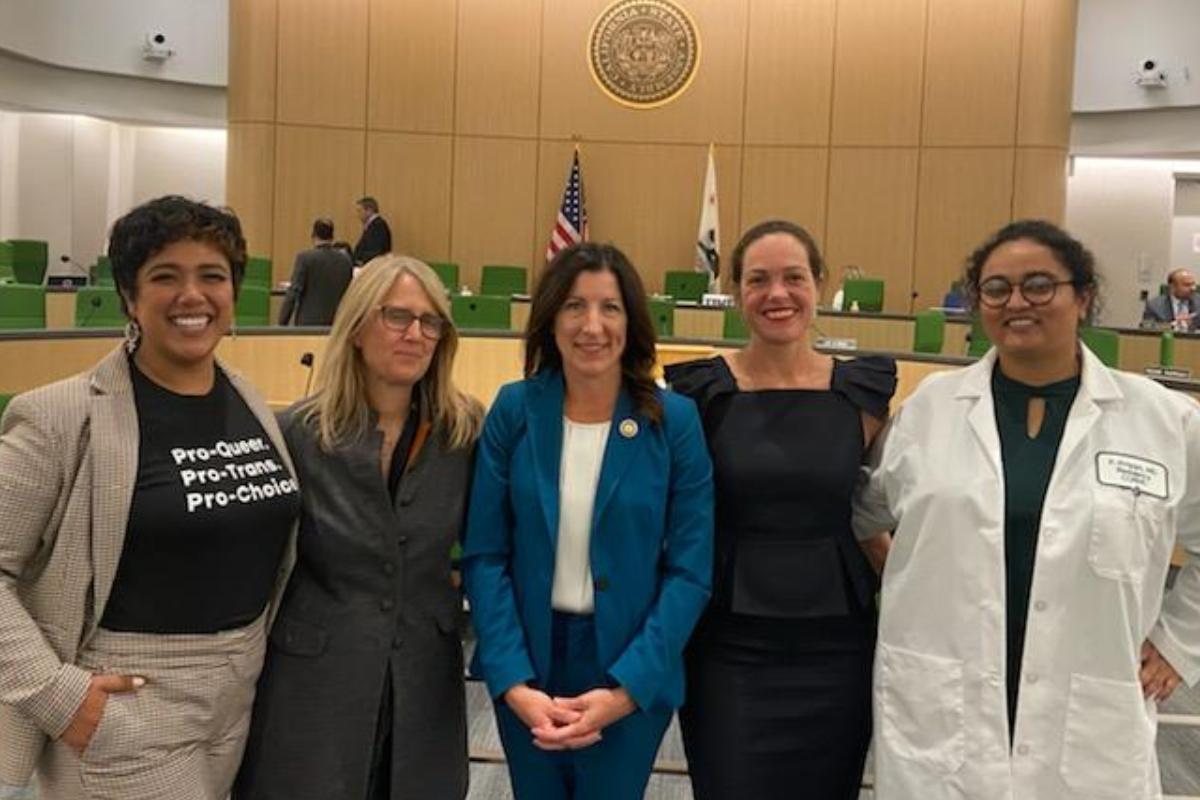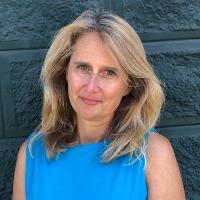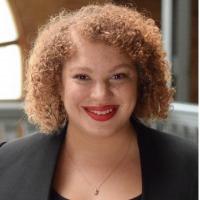
Alena Chavez, TEACH abortion training coordinator, Bethany Golden, MS, RN, CNM, Cottie Petri-Norris, assembly member, Flor Hunt, TEACH executive director, and Prachi Priyam, MD, meet with legislators at the California State Capitol in Sacramento.
How A UCSF Nurse Helped Shape a New California Health Policy
Despite California’s reputation as a “reproductive freedom state,” nearly half of California counties lack clinics that provide abortions. This is due, in large part, to a shortage of health care providers trained in abortion care.

A new bill that originated from a recommendation from nurse-midwife Bethany Golden, MS, RN, CNM, who is pursuing her doctorate degree at the UCSF School of Nursing, is changing that.
AB 1918 establishes a health service corps to expand access to reproductive health care, including abortion care, to all Californians.
The bill is the result of tireless collaboration between the historic California Future of Abortion Council (CA FAB Council), Nikki Lanshaw, MPH, project director of the Abortion Care Training Incubator for Outstanding Nurse Scholars (ACTIONS) program at UCSF, the bill’s sponsor, Training in Early Abortion for Comprehensive Healthcare (TEACH), and others.
Tackling Barriers to Reproductive Health Education
Although advanced practice nurses have had the legal authority to perform first trimester abortions in California since 2013, there are limited pathways to obtain training.
“Abortion care is often siloed, ‘above and beyond’ the standard curriculum for advanced practice nurses and rarely available,” says Golden. The training requires additional time and financial expense.
To remove economic barriers to reproductive health education, it must be integrated into nurses’ training, Golden says. It’s a perspective shared by Lanshaw.
In 2021, Lanshaw and Golden joined the workforce development work group of the CA FAB Council.
Anticipating that the U.S. Supreme Court would overturn Roe v. Wade, “the CA FAB Council was established to create legislative policy and budgetary recommendations to protect access to abortion for Californians and those that seek care in the state,” says Lanshaw.

As part of the work group, Golden recommended the creation of a service corps to bolster the state’s reproductive health workforce – a recommendation that became AB 1918.
Developing a Diverse Workforce
AB 1918 establishes the California Reproductive Health Service Corps to recruit, train and retain a diverse reproductive health workforce to work in underserved areas of the state.
The bill includes $20 million in stipends for California health care professionals who seek training to provide full-scope reproductive health care, including abortion. In exchange, corps members provide three years of service at a corps-approved clinical site in California and complete abortion training as part of their health care education. An additional $20 million is available for future stipends and scholarships.
AB 1918 seeks to diversify California’s reproductive care workforce so that it reflects the populations it serves. Scholars from historically excluded populations and underserved areas have preference for corps participation.
“We were intentional about creating structures to retain a Black, Indigenous and People of Color (BIPOC) workforce and a rural workforce, one that is representative of those that currently do not have access to adequate abortion care,” explains Golden.
Expanding Eligibility
The corps supports not only clinicians and providers in pursuing reproductive health education, but all health care staff – doulas, medical assistants, community health workers and more.
“When a patient enters a clinical space, they encounter multiple people before they encounter a provider,” Golden says. “Those interactions determine not just the quality of their patient experience, but how much information they receive.”
Additionally, to address economic barriers to education, financial support is available not just for tuition and housing expenses, but also for child care, elder care, mental health support, loan repayment and more.
Collaboration and Coordination
Gov. Gavin Newsom signed AB 1918 on Sept. 27, 2022, after a year-long process of collaboration, writing, revising and lobbying.
In addition to the CA Fab Council, Golden and Lanshaw collaborated closely with Flor Hunt, MPA, executive director of TEACH, which sponsored the bill, the office of California assembly member Cottie Petrie-Norris who authored the bill and associate professor Stella Bilous, DrPH, RN, FAAN. ACTIONS co-directors associate professor Monica McLemore, PhD, RN, and professor Linda Franck, PhD, RN, FAAN, supported the effort.
Implementation and Next Steps
As of Jan. 1, 2023, 14 of the 15 bills introduced by the CA FAB Council have been signed into law, including AB 1918.
Now Golden, Lanshaw and their partners are tackling implementation, designing didactic and clinical training pathways for reproductive health care, and identifying collaborators who share their commitment to strengthening reproductive health care training.



